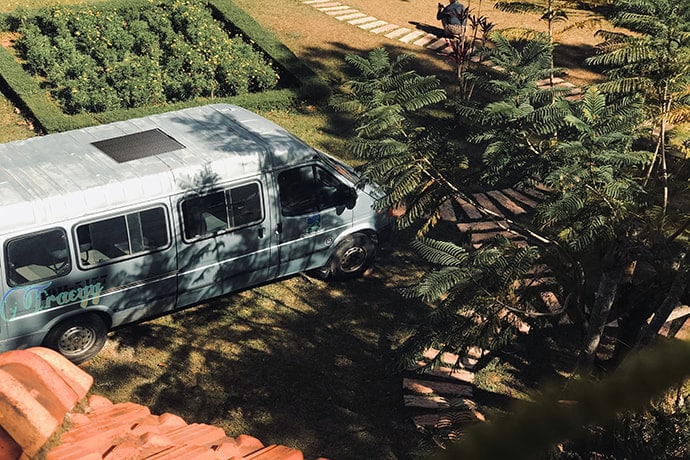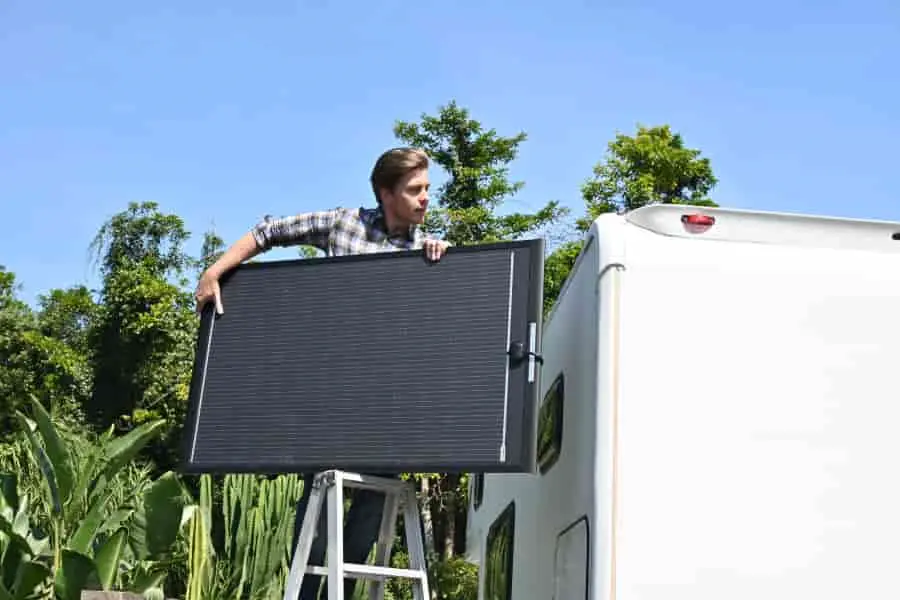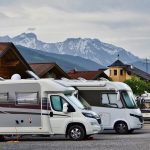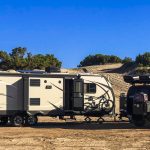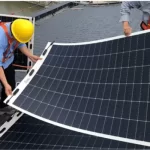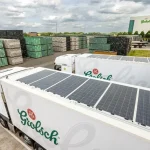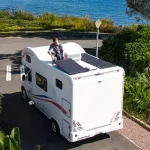Suppose you’re an Australian traveler looking for a clean, reliable power source for your camper. In that case, this guide will provide comprehensive instructions on choosing, installing, charging, and maintaining your camper solar panel system. Whether you’re looking for camper solar panels or exploring solar panels for RV campers, we’ve got all the information you need to set up your solar-powered system.
In this guide, we will discuss:
Section 1: Understanding Camper Solar Panels
Section 2: Choosing the Right Camper Solar Panel for Your Vehicle
Section 3: Installing Camper Solar Panels
Section 4: Charging Your Camper Solar Panels
Section 5: Maintaining and Monitoring Your Camper Solar Panel System
Section 6: Frequently Asked Questions
Section 1: Understanding Camper Solar Panels
Camper solar panels are an essential component of modern RV power solutions. They convert sunlight into electricity, providing a clean, reliable power source for your camper’s needs.
How Solar Panels Work
The core principle behind solar panels is the photovoltaic effect. Photovoltaic cells use the photons from sunlight to excite electrons in semiconductor materials (like silicon), generating direct current (DC) electricity. This electricity is stored in batteries through a charge controller or converted into alternating current (AC) power through an inverter for use in various appliances inside the camper.
Components of a Camper Solar System
A typical camper solar system includes solar panels, batteries, a charge controller, and an inverter. The solar panels for campers convert sunlight into electricity, while the charge controller regulates the charging process to avoid overcharging or undercharging the batteries. The inverter then converts DC power into AC power to run your camper’s electrical appliances.
Why Choose Solar Panels as a Power Solution for Your Camper?
There are numerous benefits to using solar panels for your camper:
- Eco-friendly: Solar energy is a clean, renewable resource, that reduces your carbon footprint.
- Self-sufficiency: Solar panels allow self-sufficiency, reducing reliance on traditional generators or campsite power hookups.
- Cost savings: While the initial investment may be high, solar panels can save you money on fuel and maintenance in the long run.
- Low maintenance: Solar panels have minimal maintenance needs and can last for decades, making them a reliable long-term investment.
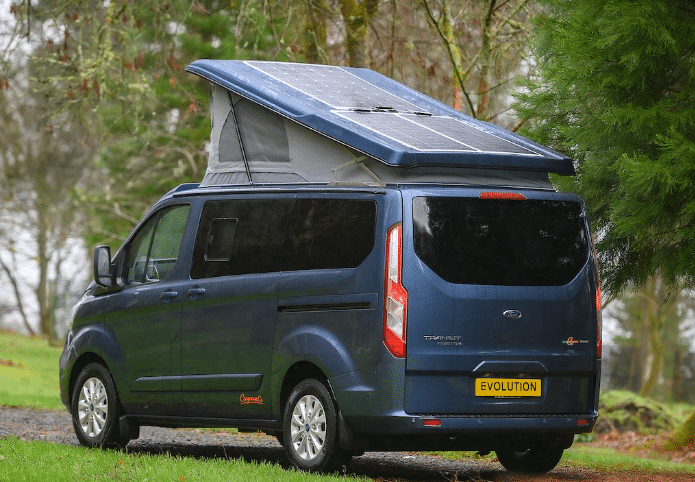
Section 2: Choosing the Right Camper Solar Panel for Your Vehicle
Selecting the right solar panel for camper use is crucial to ensure a steady and reliable power supply. Here’s a guide to help you choose the best solar panels for your camper based on your RV size, power needs, and travel conditions.
How to Choose the Solar Panel Power Based on Your Camper Size and Power Needs
The size of your camper, how you travel, and your power consumption will determine the solar panel wattage required.
- Calculating Power Needs: Understand the wattage consumption of the appliances you use in your camper (like a fridge, lights, and TV) and estimate your daily power usage. For a medium-sized camper, you’ll typically need anywhere from 100 to 400 watts of solar panels. Larger systems may require 600 watts or more.
- Adding a Buffer: To account for cloudy days, it’s recommended to select solar panels that provide about 30%-50% more power than your daily usage.
Types of Solar Panels for Campers
- Rigid Solar Panels: These are the most common type, offering high efficiency and durability. Rigid solar panels are best for permanent roof installations on your RV.
- Flexible Solar Panels: Lightweight and can be bent to fit irregular surfaces, flexible panels are great for campers with limited roof space or unconventional shapes. However, they are slightly less efficient.
- Portable Solar Panels: Ideal for short-term power needs, these panels are easy to move and set up, especially for camping off-grid.
Most Australian camper owners prefer to park their vehicles in shaded areas and place portable solar panels separately in direct sunlight for charging. For fixed installations, many prefer traditional rigid monocrystalline solar panels due to their long-term reliability and extended lifespan. Meanwhile, for those with rooftop pop-up tents, lightweight flexible solar panels are the ideal choice.
Durability and Waterproofing
Solar panels for campers need to withstand outdoor conditions. Choose solar panels with a waterproof rating of IP67 or higher to ensure they perform well in rainy or humid environments.
Lightweight Design for Easier Travel
A lightweight design is important for camper travel, as it reduces the overall weight of the vehicle. Lightweight solar panels are easier to install and remove, and they don’t add significant weight to your camper, improving fuel efficiency and handling.
Section 3: Installing Camper Solar Panels
Proper installation is key to ensuring your solar system operates efficiently. Here are the important steps to follow when installing solar panels for RV campers.
Choosing the Best Location for Installation
- Roof Installation: The roof of your camper is typically the best place for solar panel installation because it’s free from obstructions and has a large surface area. Ensure the roof is flat and solid to securely mount the solar panels.
- Alternative Locations: If the roof isn’t an option, you can mount the panels on other flat surfaces like windows or the sides of the camper. However, make sure there are no trees or other obstructions that could block sunlight.
How to Secure the Solar Panels
- Using Mounting Brackets: Use mounting brackets to secure your solar panels for campers to the roof or flat surface. These brackets should allow you to adjust the angle for maximum solar exposure.
- Adhesive Mounting: For those who don’t want to drill holes, you can use specialized adhesive to secure the panels.
- Bolt Mounting: Bolt mounting offers a more secure installation, especially for those traveling at high speeds, as it ensures the panels stay in place.
Connecting Solar Panels to the Charge Controller, Battery, and Other Components
- Wiring: Connect the solar panels using proper cables to the charge controller, and then from the charge controller to the batteries. Finally, connect the batteries to the inverter to supply AC power to your camper’s appliances.
- Wiring Safety: Ensure all cables are securely connected, without any exposed wires, to prevent electrical shorts.
Safety Measures
- Make sure that the solar panels are free from debris, such as leaves or bird droppings, as these can block sunlight and reduce efficiency.
- Always protect wiring to avoid exposure to the elements, which could lead to short-circuiting or electrical issues.
Section 4: Charging Your Camper Solar Panels
Charging your camper’s battery effectively through solar panels requires understanding how to maximize charging efficiency. Here’s how to charge your solar panels for campers efficiently.
Basic Principles of Solar Charging
Solar panels convert sunlight into DC power, which is stored in your camper’s battery via a charge controller. The charge controller prevents overcharging or undercharging, which could damage your battery.
How to Choose the Right Charge Controller to Avoid Overcharging or Undercharging
- PWM Charge Controllers: These are budget-friendly and suitable for small systems. They are less efficient compared to MPPT controllers but are adequate for lower-power needs.
- MPPT Charge Controllers: These controllers are more efficient and best for larger systems. MPPT controllers adjust the voltage to maximize charging efficiency, especially under varying sunlight conditions.
Charging Efficiency and Factors like Angle, Position, and Time
To get the most from your solar panel for camper, ensure it’s positioned at the correct angle to face the sun. Typically, midday provides the strongest sunlight. Adjust the solar panel angle to optimize exposure and ensure maximum energy production.
Ensuring Charging on Cloudy Days or at Night
Even on cloudy days, solar panels can still generate some energy. However, their efficiency is reduced. Ensure your system has a battery buffer to store enough power for nights or overcast conditions. Also, adding more solar panels can help ensure adequate power storage during longer cloudy periods.
Section 5: Maintaining and Monitoring Your Camper Solar Panel System
To ensure your solar panel system runs smoothly and lasts for years, regular maintenance and monitoring are necessary.
Regularly Check Your Solar Panels for Dirt, Debris, or Damage
Inspect your solar panels regularly to ensure they are free from dirt, leaves, or other debris that could block sunlight. Look for any signs of cracks or damage that could affect performance.
How to Clean Your Solar Panels
Use a non-corrosive cleaner and a soft cloth to clean the surface of your solar panels. Avoid abrasive materials or harsh chemicals, as these can scratch or damage the panels.
Monitoring Your Solar Panel and Battery Performance
Use a solar charge controller and battery monitor to keep track of your system’s performance. These devices will show you the voltage and current being supplied, as well as the charge level of your battery.
Troubleshooting Common Issues
- Low Power Output: Check if the solar panels are obstructed or dirty. Also, verify that the charge controller is functioning correctly.
- System Not Charging: Inspect all cable connections and ensure the batteries are in good condition.
Section 6: Frequently Asked Questions (FAQs)
How Do I Calculate the Solar Panel Wattage Needed for My Camper?
Start by identifying the total wattage of your appliances. Multiply the wattage by the average hours of use per day to estimate your power needs. A general recommendation is to select solar panels that provide 30%-50% more power than your daily consumption to allow for cloudy days.
How Do Solar Panels Work on Cloudy Days or at Night?
While solar panels produce less power on cloudy days, they can still absorb diffused light. On cloudy days, it’s important to ensure your system has enough battery capacity for overnight use.
How Long Do Solar Panels Last?
Most solar panels last between 25 and 30 years, but regular maintenance can extend their lifespan.
What Should I Do If My Solar Panel Is Charging Slowly or Not Responding?
Check the solar panels for dirt, damage, or obstruction. Verify that all connections are secure, and ensure that the charge controller is functioning properly.


